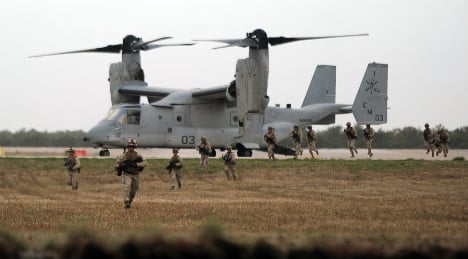When armed militants stormed the American consulate in Benghazi in 2012, the United States couldn't get its crisis-response forces to Libya fast enough.
By the time troops were ready to mount a rescue, it was too late – Ambassador Chris Stevens and three other American personnel were dead.
Three years on, even as the fallout from the attack still clouds the American political scene, the Pentagon has moved to make sure such a disaster won't happen again.
Here on a flat, muddy-brown expanse of fields near Morón de la Frontera in southern Spain, about 60 kilometres (40 miles) southeast of Seville, the United States has struck a military cooperation deal with Madrid that allows for a permanent deployment of up to 2,200 US service members, mainly Marines and sailors.
Currently, about 800 US forces are deployed here, along with a fleet of MV-22B troop-carrying Osprey aircraft that can take off and land like helicopters, then tilt their rotors to fly like planes.
Though it is in Europe, the sprawling Marine Corps base answers to the US military's Africa command and concentrates on the other side of the Mediterranean.
“Right now, we are focused on those embassies that are positioned in the countries deemed most at risk for crisis,” Colonel Calvert Worth told AFP during a trip to the base this month.
“We have forces here that can operate out of Morón that can respond to western Africa, the Gulf of Guinea and northern Africa when called upon,” Worth added.
AFP visited Morón while accompanying US Defence Secretary Ashton Carter, who visited US troops and thanked his Spanish counterpart Pedro Morenes ahead of a NATO meeting called to assess emerging security threats along the 28-nation alliance's southern flank.
Alongside the US personnel, the Spanish military has hundreds of its own troops at the base as part of two Spanish air force squadrons, and troops from the two nations train together.
Too slow
Stevens was the first ambassador to be killed on duty since 1979 in the horrific attack on the Benghazi consulate on September 11th, 2012 when dozens of armed men stormed the building, bombarding it and torching it.
Officials have said the consulate was a sitting duck, with weak security and requests for extra staffing denied despite a rising Al-Qaeda threat.
Pentagon officials tried to respond to an unfolding crisis but were hamstrung by distance. Then defense secretary Leon Panetta sent a surveillance drone but it took about 90 minutes to get there.
He also ordered troops from the United States and special operations forces in Europe to a NATO base in Sigonella in Sicily for a potential rescue. But by the time the units arrived in southern Italy, the consulate had already been torched and ransacked.
Republicans mauled Hillary Clinton, who was then secretary of state, blaming her for what they called a lack of security. She will testify Thursday before a House of Representatives panel investigating the attacks at the consulate and another Benghazi compound also hit that night.
Although critics accuse the panel of a witch hunt targeting Clinton, the issue likely will keep dogging Clinton as she seeks the Democratic presidential nomination. She is the frontrunner in the Democratic race.
Six hours to deploy
The Benghazi attack happened fast, catching the US off guard. Though there's no way troops could have deployed from Morón quickly enough to intervene, the idea now is that they will travel to hot spots and be within striking distance at the first sign of trouble.
Such prepositioning in bases like Sigonella and also in Africa including in Senegal, Ghana and Gabon means troops can pounce on an emerging crisis.
Troops are on a constant state of readiness and can be in the air soon after an alarm sounds.
“Once we get a call from here, we can be wheels-up on our birds (Ospreys) within six hours,” said Sergeant David Bloxham, a Marine machine-gunner.
“We have a thousand-mile bubble that we can generally deploy to.”
The Special-Purpose Marine Air-Ground Task Force Crisis Response team, or MAGTF, has already deployed several times.
In July of last year, Marines flew from the sister base in Sigonella and provided air support while the US embassy in Tripoli was evacuated. In that event, the troops were not needed on the ground and remained airborne, but they could have landed at a moment's notice.
Carter also visited Sigonella, which houses a fleet of drones including armed Predators and Global Hawk surveillance craft.
By Thomas Watkins / AFP



 Please whitelist us to continue reading.
Please whitelist us to continue reading.
Member comments